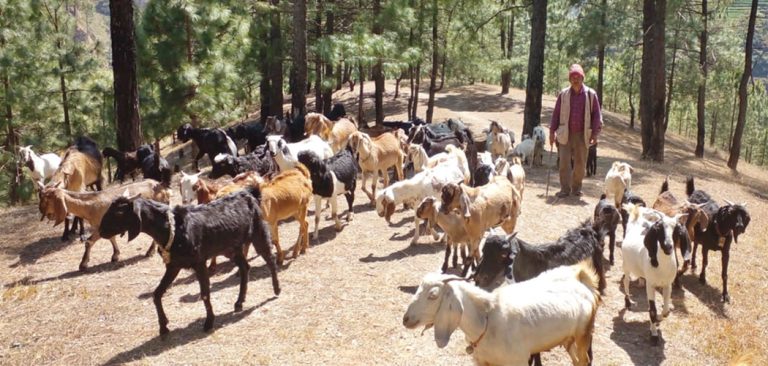After years of struggling abroad, Padam Bahadur Airi, 50, has found success in self-entrepreneurship in his hometown. Instead of facing hardship and humiliation overseas, he chose to invest in goat farming, proving that sustainable livelihoods can be built at home.
Airi, a resident of Jukepani in Sigash Rural Municipality-1, spent years in India searching for employment to support his 10-member family. Scarce agricultural yields due to unreliable rainfall forced him to migrate, leading him to work as a security guard in Delhi. Despite enduring hardships, he persevered to secure his family’s future.
A New Beginning in Agriculture
Upon returning home with his savings, Airi made a bold decision—rather than seeking foreign employment again, he invested in his homeland. Using Rs. 475,000, which included his earnings and a small loan, he ventured into goat rearing. Recognizing his initiative, the rural municipality granted him Rs. 50,000 for constructing a goat shed.
Today, Airi owns 65 goats, including kids, and sees immense potential in animal husbandry. “If we invest in agriculture and livestock, we can create jobs for our youth within our own villages,” he said. His story is a testament to how small-scale investments in agriculture can transform lives and discourage migration.
Youth Migration and Lack of Opportunities
Ward Chairperson Ram Chandra Airi stated that nearly 80% of youth from the 419 households in Sigash Rural Municipality-1 seek employment abroad. In Bajkot’s Giwadikhola Settlement, all Dalit youth work as laborers in India due to limited local opportunities.
While the government has introduced initiatives like The Prime Minister’s Employment Programme, other employment-generating schemes remain scarce. Despite infrastructure development, government funds are often directed toward non-productive sectors, such as temple renovations, instead of commercial agriculture or livestock farming.
A Ray of Hope for Agriculture
Even with economic challenges, some villagers have started exploring alternative agricultural ventures. Those with access to paved roads have begun commercial potato farming, and Ward Chairperson Airi himself has joined the initiative. These efforts indicate a growing realization that farming can be a viable alternative to foreign employment.
A Call for Greater Investment
Airi’s journey from a struggling migrant worker to a successful goat farmer underscores the need for more investment in local industries. If supported with adequate funding, training, and market access, agriculture and animal husbandry can provide sustainable livelihoods, reducing the need for migration.


